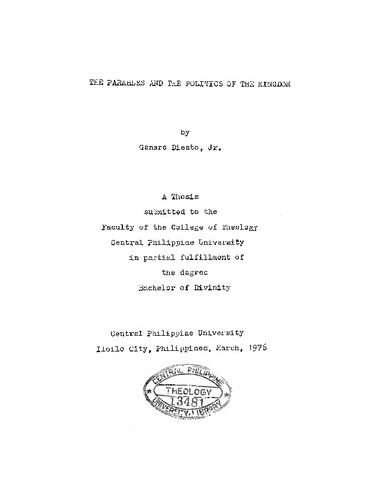The parables and the politics of the kingdom
| dc.contributor.author | Diesto, Genaro Depakakibo Jr. | |
| dc.date.accessioned | 2022-05-20T04:17:11Z | |
| dc.date.available | 2022-05-20T04:17:11Z | |
| dc.date.issued | 1976 | |
| dc.identifier.citation | Diesto, G. D. , Jr. (1976). The parables and the politics of the kingdom (Unpublished thesis). Central Philippine University, Jaro, Iloilo City. | en_US |
| dc.identifier.uri | https://hdl.handle.net/20.500.12852/2054 | |
| dc.description | Introduction | en_US |
| dc.description.abstract | The question of the relevance of the teachings of Jesus in modern day situations has been one of the more important and oft-discussed subjects in Christian thought. Social conditions inevitably change, and each major change in the conditions present new problems or at least new dimensions to old problems with which the Christian, seeking to live out his faith is confronted. The Christian then, with every change, has to reckon with Christ's teachings in the context of the situation in which he finds himself. One of the more urgent problems that confronts Christians and for that matter, the church today is the phenomenon of revolution. This is especially true of churches in poor, underdeveloped (some use the term "Third World") countries who face the grim realities of economic privation, social injustice, militarism and tyrannical rule on the one hand, and revolutionary movements and groups who seek to overthrow such oppressive conditions on the other. The church's reactions to this problem are varied, and in many cases, specific issues pertaining to the problem have divided and polarized the body of faith into two groups: one group seeing Jesus' life and his teachings as having political import and consequently posing a challenge to active political involvement; the other insisting on Christ’s apolitical attitudes toward civil society, seeing Christ as having stood above political realities, resulting in an uninvolved political stance. The former group is further divided into two factions in terms of their active involvement. One faction has taken the option of armed revolution. Camilo Torres, a Catholic priest and one-time chaplain and sociology professor at the National University of Bogota, who perished in an armed encounter with Colombian troops on February 15, 1966, is a classic example of the many others who have taken that route. The other faction took the non-violent revolutionary stance. Such is the case of the Latin American Archbishop of the Catholic church, Dom Helder Camara who experienced imprisonment and other repressive measures taken against him and many others for their active participation in the struggle for liberation. The latter group standing in opposition can also be further divided into two factions: one faction having nothing to do with politics or political issues at all, the other taking a stand against revolutionary politics but taking active part in status quo politics. But all groups and factions readily quote scriptures to support their stances, and insist on their interpretation of scripture as the proper interpretation which all the rest should follow. This has resulted in a divided witness and in many cases, a weakened ministry. It is clear that for the church to arrive at the proper understanding of its mission and for the members to take a unified action, a closer look at the life and teachings of Jesus should be seriously undertaken. This project is an attempt to answer the question of Christ's teaching on the phenomenon of revolution. While the socio-economic and political situation in Palestine during Jesus’ time was somewhat similar to the conditions of many Third World countries today, the answers gleaned from this study may not readily apply to modern-day situations. This is especially true because each individual environment has its own particular characteristics which are uniquely its own, hence what may apply to one may not necessarily apply to another. The writer desires however to be able to indicate at least the fundamental elements in Jesus' teachings pertaining to the problem by which modern day Christians can derive guidance in their own particular situations. The writer has limited the area of study to the parables which Jesus taught since the parables have been widely used by Jesus to communicate concepts, values and. truths about the nature of God's reign. The examination of the question involves the consideration of three main heads: I. Studies on the pertinent background material in Jesus' time. II. The Messianic Hope III. The Parables of Liberation There are quite a number of references pertaining to the study and Interpretation of the Parables of Jesus, but since the writer does not intend to present an exhaustive study on the given subject, this project will deal more with the interpretation of the intent and meaning of the parables in light of their historical context, and whenever possible, an attempt will be made to correlate said. Interpretations with modern day situations. | en_US |
| dc.format.extent | 107 leaves | en_US |
| dc.language.iso | en | en_US |
| dc.subject.ddc | TheoLib Thesis 207.2 D566 | en_US |
| dc.subject.lcsh | Religion and politics | en_US |
| dc.subject.lcsh | Christianity and politics | en_US |
| dc.subject.lcsh | Christianity and politics--Biblical teaching | en_US |
| dc.subject.lcsh | Liberation theology | en_US |
| dc.subject.lcsh | Revolutions--Religious aspects--Christianity | en_US |
| dc.subject.lcsh | Revolutions--Religious aspects | en_US |
| dc.subject.lcsh | Revolutions--Biblical teaching | en_US |
| dc.title | The parables and the politics of the kingdom | en_US |
| dc.type | Thesis | en_US |
| dcterms.accessRights | Not publicly accessible | en_US |
| dc.description.bibliographicalreferences | Includes bibliographical references | en_US |
| dc.contributor.department | College of Theology | en_US |
| dc.description.degree | Bachelor of Divinity | en_US |


